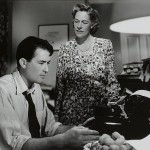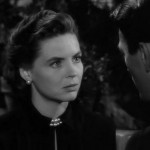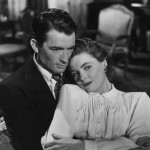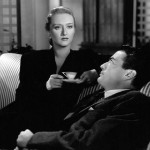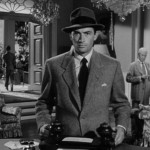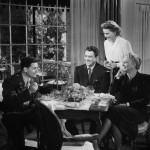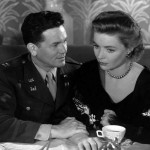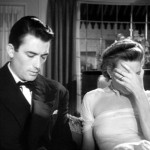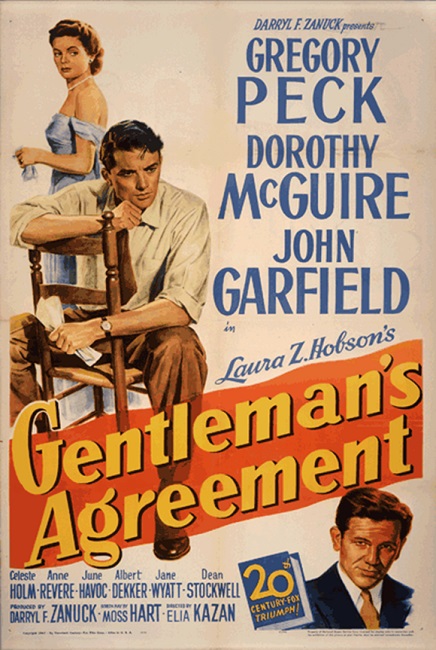
Gentleman’s Agreement – 1947
I’m not sure why, but this one turned out to be a pretty long review.
Plain and simple, this movie was about anti-Semitism and its message was shouted loud and clear. For those who might not know, anti-Semitism is a very specific prejudice against Jewish people. It actually required that I do a bit of research into the subject. The title of the film, Gentleman’s Agreement, is not exactly an obvious one. It was not clear as to why this movie was so called until about three quarters of the way through the movie. The point was made that the unjust treatment of the Jewish people was a problem that was not talked about. It was generally hushed up and ignored, not recognized, and not dealt with. It was a sort of gentleman’s agreement that the distasteful subject should just be overlooked by polite society.
I have been fortunate not to have grown up in or lived in an environment that that exposed me to that kind of prejudice. That being the case, I don’t understand why any person would treat another human being differently because of a religion that he follows. However, times were different back then and social attitudes and prejudices were likewise different. In 1947, following the end of World War II, anti-Semitism was a real problem. This movie took a definite stance and attempted to practice exactly what it preached. It is not enough to just say you are not anti-Semitic. You have to behave in a manner that actively fights against it. Social change begins at home.
The film starred Gregory Peck as Philip Green, a journalist recently moved to New York, who is commissioned to write an article on anti-Semitism. He has a reputation for writing powerful and thought-provoking articles, but even he is daunted by the sensitive subject. He finds that he has difficulty finding the profound and unique angle that he needs to make the article what he wants it to be. His solution, since he is still mostly unknown in New York, is to tell everyone that he is Jewish and see, first hand, how he is treated. By today’s standards, he is treated horribly.
But I had to ask myself: how accurate was the problem depicted in the film? Here is where my little bit of research comes in. Apparently, it was just as bad as it was portrayed, though maybe not so concentrated. Here is what that means: In the film, Green starts telling people that he is Jewish. Immediately and categorically, he and his family are shunned, ostracized, cheated, verbally and socially abused, and in general treated like second class citizens.
But therein lies the one major problem I had with the plot. The writers seemed to make a list of all the most common forms of anti-Semitism, then one by one, they forced them upon Mr. Green, and by extension, the audience. This made the story seem contrived, and consequently, very preachy. Maybe that was their goal. They went out of their way to examine the issue from a number of different angles and points of view. How does it affect the Jewish people? How does it affect non-Jews? How does it affect Jewish children? What forms of behavior are considered anti-Semitic? How do Jews react to the extreme injustices they are forced to endure? How do they cope with this horrible form of prejudice? All these questions are systematically asked and answered.
Most of the characters in the movie are aware that anti-Semitism is an ugly thing. But the movie also makes this point: simply looking the other way and allowing such behavior to continue is just as bad as perpetrating it. This point is really driven home in Mr. Green’s relationship with his fiancé, Kathy Lacey, played by Dorothy McGuire. I thought this actress did a wonderful job. Not only did I like the way her part was acted, I liked the way it was written. From the beginning, Green let her in on the charade, but her initial reaction to the scheme set the tone for everything that came to follow. As soon as he told her that he was going to “come out” as Jewish, McGuire did a fantastic job of showing you exactly what went through Lacey’s mind. She was afraid of being known as the fiancé of a Jew. It was an instinctive reaction, but not because she thought she would be known as a Jew herself. It was because she knew how badly Jews were being treated and she was afraid of being treated that way. It seems to me to be a subtle but significant difference. I thought her reaction was understandable.
However, her character’s behavior, when viewed critically, could be considered anti-Semitic – but usually in an indirect way. You have to really be looking for it; you have to WANT to see it. At one point, she is so tired of being treated so harshly whenever he perceives her as being anti-Semitic, she leaves him, and I said “Good for her!” I didn’t really like Peck’s character. He was so obsessed with his article that he forced everyone in his life to endure the hardships that he willingly took upon himself. It was all about him, and everyone else be damned. Sure anti-Semitism was a real problem, but the innocent people around him were made to suffer for his ideals. I would have left him, too.
A breath of fresh air amid the heavy cloud of the film’s drama was the character of Anne Dettrey, played by Celeste Holm. She won the Academy Award for Best Supporting Actress for the role. She was a character who was truly not anti-Semitic. As Mr. Green’s co-worker and friend, she was unashamed of her Jewish friends and the actress really did a fine job showing it. In fact, half the time I wanted Mr. Green to end up with her at the end of the movie because she was such a genuine and self-assured character. She was honest and sympathetic to the plights of others. And she was a true enough friend to be brutally honest with Mr. Green when he really needed it.
I also have to mention John Garfield, who played Mr. Green’s Jewish friend Dave Goldman, who gave him yet another perspective on the issue. He was a bigger name actor at the time, but because he was actually Jewish and wanted to be a part of the film, he took a smaller supporting role. He did a great job, and was very believable in the part.
This movie was informative and honest about the subject of anti-Semitism, but as a plots go, it seemed a bit too contrived, and had a tendency to force its point on the audience. Anti-Semitism is a cruel and ugly thing that has no place in a civilized world. I get it. But it was so forcefully shoved down my throat, I almost felt like I, myself, was being accused of anti-Semitism for even sympathizing with McGuire’s character. It is alright to make a point, but I felt like it went a little too far.
All that being said… everything that the film tried to say is unfortunately true, and it is sad that there are still anti-Semitic people in the world today.
Interesting Note: The political nature of the film upset the House Un-American Activities Committee. Elia Kazan (Director), Darryl Zanuk (Producer), John Garfield, and Anne Rever (actress who played Mrs. Green – Mr. Green’s mother) were all called to testify before the committee. Revere refused to testify outright and although Garfield appeared, he refused to “name names”. Both were placed in the Red Channels of the Hollywood Blacklist.
